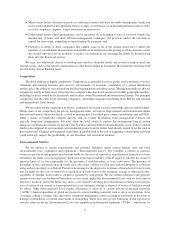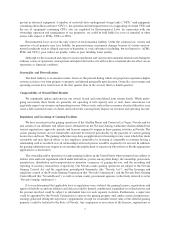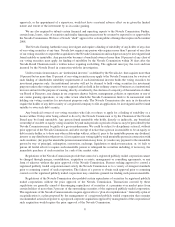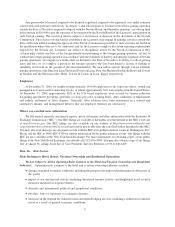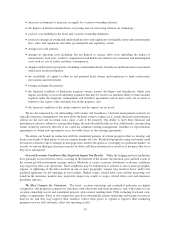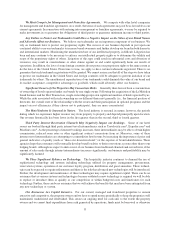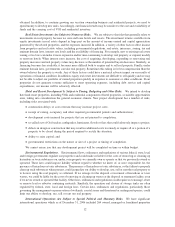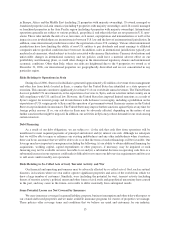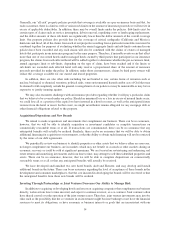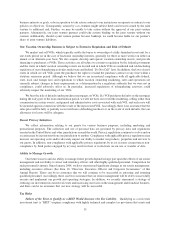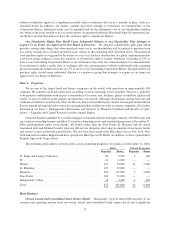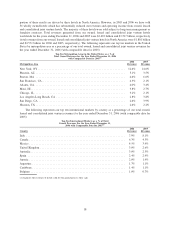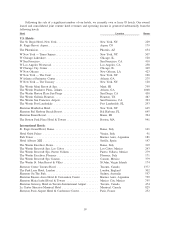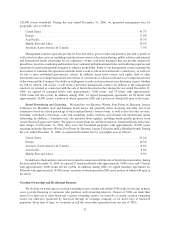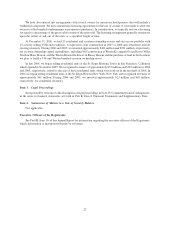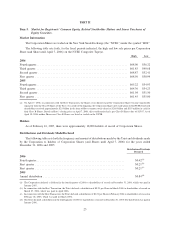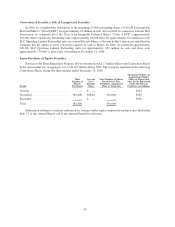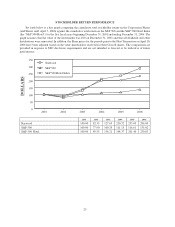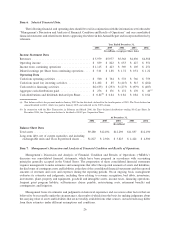Starwood 2006 Annual Report Download - page 23
Download and view the complete annual report
Please find page 23 of the 2006 Starwood annual report below. You can navigate through the pages in the report by either clicking on the pages listed below, or by using the keyword search tool below to find specific information within the annual report.administrative agencies have interpreted only to a limited degree. Due to the complexities of our ownership,
structure and operations, the Trust is more likely than are other REITs to face interpretative issues for which there
are no clear answers. Also, facts and circumstances that we do not control may affect the Trust’s ability to qualify as
a REIT. The Trust believes that for the taxable years ended December 31, 1995 through April 10, 2006, the date
which Host acquired the Trust, it has qualified as a REIT under the Internal Revenue Code of 1986, as amended. If
the Trust fails to qualify as a REIT for any prior tax year, we would be liable to pay a significant amount of taxes for
those years. Subsequent to the Host Transaction, the Trust is no longer owned by us and we are not subject to this
risk for actions following the transaction.
Evolving government regulation could impose taxes or other burdens on our business. We rely upon
generally available interpretations of tax laws and other types of laws and regulations in the countries and locales in
which we operate. We cannot be sure that these interpretations are accurate or that the responsible taxing or other
governmental authority is in agreement with our views. The imposition of additional taxes or causing us to change
the way we conduct our business could cause us to have to pay taxes that we currently do not collect or pay or
increase the costs of our services or increase our costs of operations.
Our current business practice with our internet reservation channels is that the intermediary collects hotel
occupancy tax from its customer based on the price that the intermediary paid us for the hotel room. We then remit
these taxes to the various tax authorities. Several jurisdictions have stated that they may take the position that the tax
is also applicable to the intermediaries’ gross profit on these hotel transactions. If jurisdictions take this position,
they should seek the additional tax payments from the intermediary; however, it is possible that they may seek to
collect the additional tax payment from us and we would not be able to collect these taxes from the customers. To the
extent that any tax authority succeeds in asserting that the hotel occupancy tax applies to the gross profit on these
transactions, we believe that any additional tax would be the responsibility of the intermediary. However, it is
possible that we might have additional tax exposure. In such event, such actions could have a material adverse effect
on our business, results of operations and financial condition.
Risks Relating to Ownership of Our Shares
No Person or Group May Own More Than 8% of Our Shares. Our current governing documents provide
(subject to certain exceptions) that no one person or group may own or be deemed to own more than 8% of our
outstanding stock or Shares of beneficial interest, whether measured by vote, value or number of Shares. There is an
exception for shareholders who owned more than 8% as of February 1, 1995, who may not own or be deemed to own
more than the lesser of 9.9% or the percentage of Shares they held on that date, provided, that if the percentage of
Shares beneficially owned by such a holder decreases after February 1, 1995, such a holder may not own or be
deemed to own more than the greater of 8% or the percentage owned after giving effect to the decrease but we have
the right to waive this limitation. This ownership limit may have the effect of precluding a change in control of us by
a third party without the consent of our Board of Directors, even if such change in control would otherwise give the
holders of Shares or other of our equity securities the opportunity to realize a premium over then-prevailing market
prices.
Our Board of Directors May Issue Preferred Stock and Establish the Preferences and Rights of Such
Preferred Stock. Our charter provides that the total number of shares of stock of all classes which the Corporation
has authority to issue is 1,350,000,000, initially consisting of one billion shares of common stock, 50 million shares
of excess common stock, 200 million shares of preferred stock and 100 million shares of excess preferred stock. Our
Board of Directors has the authority, without a vote of shareholders, to establish the preferences and rights of any
preferred or other class or series of shares to be issued and to issue such shares. The issuance of preferred shares or
other shares having special preferences or rights could delay or prevent a change in control even if a change in
control would be in the interests of our shareholders. Since our Board of Directors has the power to establish the
preferences and rights of additional classes or series of shares without a shareholder vote, our Board of Directors
may give the holders of any class or series preferences, powers and rights, including voting rights, senior to the
rights of holders of our shares.
Our Board of Directors May Implement Anti-Takeover Devices and our Charter and By-Laws Contain
Provisions which May Prevent Takeovers. Certain provisions of Maryland law permit our Board of Directors,
16


